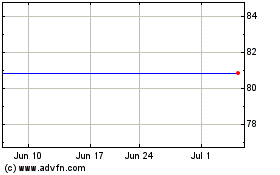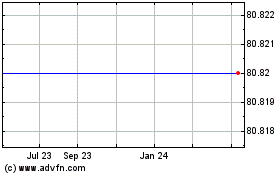St. Jude Medical Announces Principal Investigators in Transcatheter Aortic Valve Implantation (TAVI) Clinical Trial
September 28 2010 - 8:00AM
Business Wire
St. Jude Medical, Inc. (NYSE:STJ), a global medical device
company, today announced that physicians from the Cedars-Sinai
Heart Institute will lead the company’s transcatheter aortic valve
implantation (TAVI) clinical trial. The study will evaluate the
safety and efficacy of the St. Jude Medical transcatheter aortic
valve for patients who experience severe aortic stenosis and who
may be at an elevated risk for open-heart surgery.
“St. Jude Medical is pleased to have world-renowned physicians
directing the clinical research for our TAVI program,” said Frank
J. Callaghan, president of the St. Jude Medical Cardiovascular
Division. “Dr. Gregory Fontana and Dr. Raj Makkar have been
extensively involved in previous research efforts pertaining to
transcatheter aortic valve implantation and are leading authorities
for these technologies. We believe this is an important milestone
for our program.”
Raj Makkar, M.D., director of interventional cardiology and
associate director of the Cedars-Sinai Heart Institute in Los
Angeles, has extensive experience in high-risk percutaneous
coronary and valvular interventions and the use of advanced
percutaneous circulatory support devices. Under Dr. Makkar’s
direction, Cedars-Sinai physicians completed the most aortic valve
replacements in an international clinical trial at more than 20
medical centers. He is a principal investigator for several
research protocols involving transcatheter interventions and
devices.
Gregory Fontana, M.D., is a cardiac surgeon at the Cedars-Sinai
Heart Institute and has been a principal investigator for several
research protocols involving transcatheter interventions and
minimally invasive surgical devices. As a widely published
researcher and author, Dr. Fontana’s writings include more than 80
academic works appearing as articles, book chapters, abstracts and
reviews. Published subject matter includes treatments for diseases
of the coronary arteries, heart valves, heart transplantation and
congenital heart defects.
Dr. Fontana presented a paper, “Progress with the St. Jude
Medical TAVI System,” at the 22nd annual Transcatheter
Cardiovascular Therapeutics (TCT) meeting in the Walter E.
Washington Convention Center in Washington, D.C.
The St. Jude Medical transcatheter heart valve, made of
pericardial tissue, is designed to increase physicians’ control and
accuracy during valve deployment. Two delivery methods for the St.
Jude Medical transcatheter valve will be evaluated in the trial,
the transfemoral and the transapical systems, which are both
designed to make transcatheter valve deployment and retrieval
easier for clinicians.
The European clinical trial of the St. Jude Medical
transcatheter aortic valve is expected to start in 2011.
About St. Jude Medical
St. Jude Medical develops medical technology and services that
focus on putting more control into the hands of those who treat
cardiac, neurological and chronic pain patients worldwide. The
company is dedicated to advancing the practice of medicine by
reducing risk wherever possible and contributing to successful
outcomes for every patient. St. Jude Medical is headquartered in
St. Paul, Minn. and has four major focus areas that include:
cardiac rhythm management, atrial fibrillation, cardiovascular and
neuromodulation. For more information, please visit sjm.com.
Forward-Looking Statements
This news release contains forward-looking statements within the
meaning of the Private Securities Litigation Reform Act of 1995
that involve risks and uncertainties. Such forward-looking
statements include the expectations, plans and prospects for the
Company, including potential clinical successes, anticipated
regulatory approvals and future product launches, and projected
revenues, margins, earnings and market shares. The statements made
by the Company are based upon management’s current expectations and
are subject to certain risks and uncertainties that could cause
actual results to differ materially from those described in the
forward-looking statements. These risks and uncertainties include
market conditions and other factors beyond the Company’s control
and the risk factors and other cautionary statements described in
the Company’s filings with the SEC, including those described in
the Risk Factors and Cautionary Statements sections of the
Company’s Quarterly Report on Form 10-Q for the fiscal quarter
ended April 3, 2010. The Company does not intend to update
these statements and undertakes no duty to any person to provide
any such update under any circumstance.
SJM (NYSE:STJ)
Historical Stock Chart
From Jun 2024 to Jul 2024

SJM (NYSE:STJ)
Historical Stock Chart
From Jul 2023 to Jul 2024
